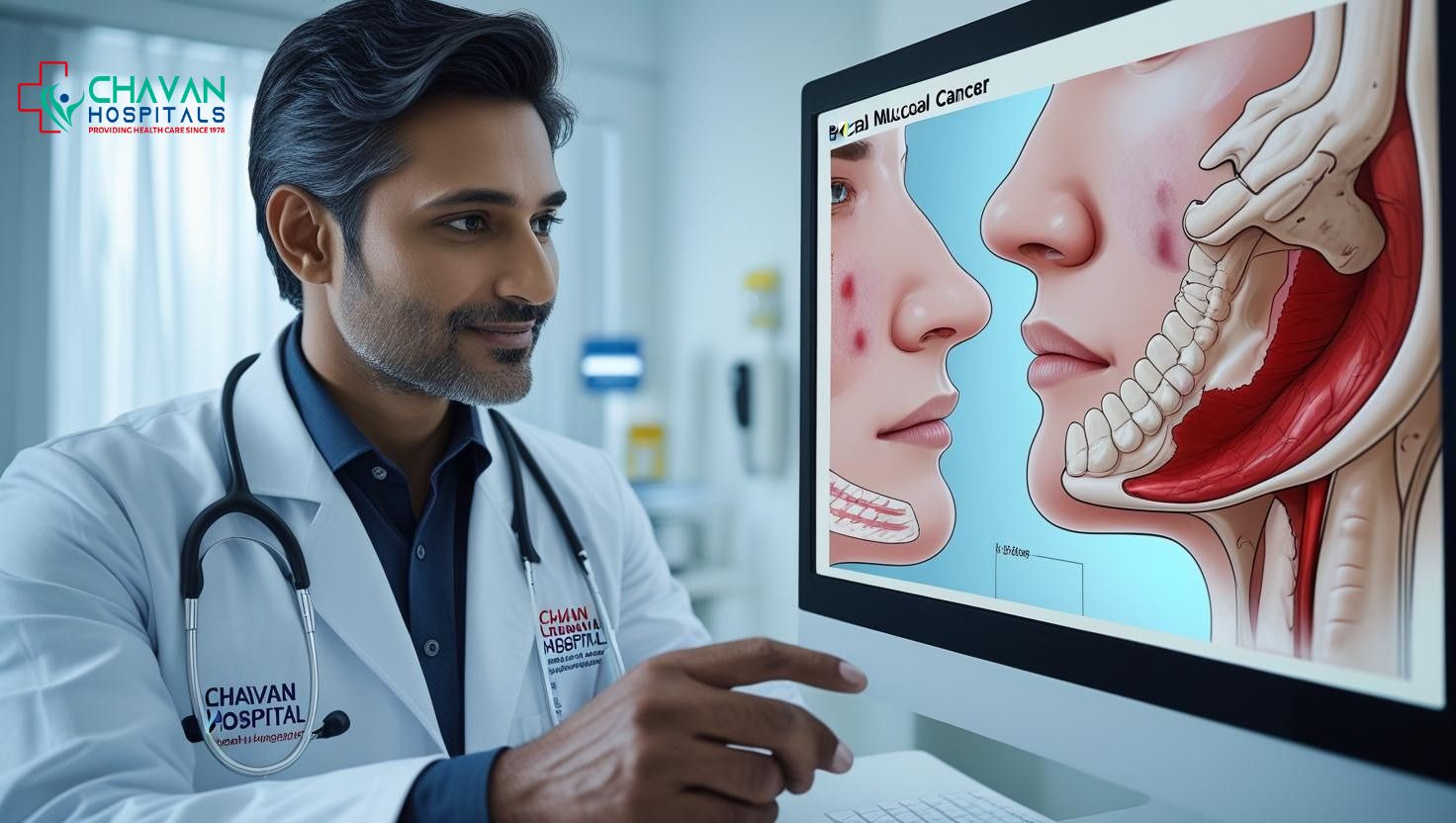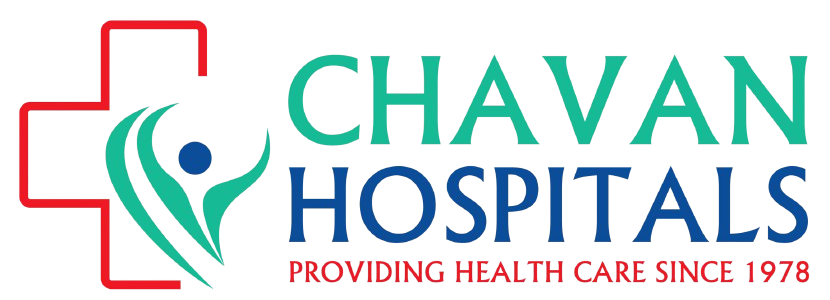- Home
- About us
- Specialities
Superspeciality
- Doctors
- Resources
- Contact us
Buccal Mucosa (Inner Cheek) Cancer: Diagnosis, Treatment
One kind of cancer of the oral cavity that develops in the thin, delicate lining within the cheeks is buccal mucosa cancer, often known as inner cheek cancer. Even though it might start off as a tiny ulcer or patch, if treatment is not received, it can spread quickly. This cancer can be both deformative and fatal, and it is frequently associated with lifestyle choices like chewing tobacco and not practicing good oral hygiene. Prompt treatment and early detection are essential.
As the top cancer hospital in Balapur, Hyderabad, Chavan Hospital offers specialized head and neck cancer care by fusing cutting-edge diagnostics with individualized multidisciplinary treatment regimens. In addition to curing, we aim to maintain speech, facial features, and quality of life whenever we can.

What Is Buccal Mucosa Cancer?
Buccal mucosa cancer is a squamous cell carcinoma that begins in the mucosal lining of the cheeks. It is one of the most common forms of oral cancer in India, largely due to the high prevalence of tobacco chewing, betel nut use, and poor oral hygiene practices. The disease often begins subtly, mimicking benign conditions like canker sores or cheek irritation, which makes early diagnosis challenging.
When caught early, it can be effectively treated. If not, it can invade deeper tissues, affect facial function, and spread to nearby lymph nodes or distant organs. That’s why comprehensive screening, biopsy, and imaging are essential to manage the disease effectively.
Signs and Symptoms
Early signs of buccal mucosa cancer can be deceptively mild. Being aware of these signs and acting quickly can significantly impact outcomes:
- Persistent ulcer or sore in the inner cheek that doesn’t heal within two weeks
- White (leukoplakia) or red (erythroplakia) patches on the cheek lining
- Lump or thickening in the cheek
- Pain or discomfort when chewing or speaking
- Restricted jaw movement
- Ear pain without infection
- Numbness in the cheek or jaw
- Bleeding from the mouth
- Unexplained weight loss
- Enlarged lymph nodes in the neck
Even if the symptoms seem minor, consulting an expert oncologist at Chavan Hospital ensures timely evaluation and peace of mind.
Is Buccal Mucosa Cancer Dangerous?
Yes. If left untreated, it can invade adjacent tissues, including the jawbone, tongue, or skin, causing facial disfigurement and dysfunction. More alarmingly, it can spread (metastasize) to regional lymph nodes and distant organs like the lungs. However, with timely intervention and advanced care, this danger can be minimized.
Is Buccal Mucosa Cancer Curable?
It is possible to cure buccal mucosa cancer, particularly if caught early. The tumor can frequently be completely removed with a combination of chemotherapy, radiation therapy, and surgery.
Early-stage malignancies have a 70–90% 5-year survival probability, whereas advanced stages require more rigorous therapy but still provide hope if treated appropriately. The survival rate is highly dependent on the stage of the cancer at diagnosis.
Diagnosis at Chavan Hospital
At Chavan Hospital, early and precise diagnosis forms the backbone of effective cancer care. Our diagnostic process includes:
- Clinical Examination: A detailed oral check for lesions, ulcers, and nodal involvement.
- Biopsy: Tissue sampling for histopathological confirmation.
- Imaging Studies: CT scan, MRI, or PET-CT to determine the extent of tumor spread, both locally and in surrounding regions.
- Endoscopic Evaluation: To assess extension into throat or nasal passages when required.
- Staging: Using TNM (Tumor, Node, Metastasis) classification to decide on the most effective treatment plan.
Our expert oncology and maxillofacial teams ensure a multidisciplinary evaluation, where surgeons, radiation oncologists, dental experts, and dietitians contribute to your personalized care plan.
Treatment for Buccal Mucosa Cancer at Chavan Hospital
At Chavan Hospital, we believe in comprehensive cancer care that balances curative treatment with the patient’s overall wellness, facial aesthetics, speech, and nutrition.
1. Surgical Treatment
Surgical resection remains the primary treatment for most buccal mucosa cancers. Depending on the tumor stage and location, surgery may involve:
- Wide local excision of the lesion with safe margins
- Mandibulectomy (partial removal of jawbone) in case of bone involvement
- Neck dissection to remove lymph nodes if cancer has spread
- Reconstructive surgery using flaps or grafts to restore function and appearance
Our surgical team at Chavan is experienced in performing complex resections with minimal scarring and functional preservation, ensuring that speech and chewing ability are retained.
2. Radiation Therapy
In early-stage cancers or when surgery is not viable, radiotherapy is highly effective. It is also used post-surgery to eliminate microscopic residual disease. We use advanced radiotherapy techniques like IMRT (Intensity Modulated Radiation Therapy) to precisely target the tumor while sparing healthy tissue.
3. Chemotherapy
Chemotherapy is used in:
- Advanced stages
- Recurrences
- In combination with radiotherapy (concurrent chemoradiation)
Our team monitors every patient carefully to minimize side effects and support nutritional and emotional health throughout therapy.
4. Targeted Therapy & Immunotherapy
For select patients, especially those with recurrence or non-responsive disease, targeted therapies or immunotherapy drugs may be considered. These modern approaches focus on cancer cells specifically, offering treatment with fewer systemic side effects.
5. Palliative Care
For patients with advanced or incurable cancer, Chavan Hospital’s palliative care team provides compassionate support to relieve symptoms, manage pain, and improve quality of life.
FAQ's
Is buccal mucosa cancer curable?
Yes. When detected early and treated with appropriate surgery and therapy, buccal mucosa cancer has a high cure rate. Even in advanced stages, treatment can control disease and prolong life.
How serious is inner cheek cancer?
It can be very serious if ignored. The cancer may spread to surrounding tissues, lymph nodes, and other organs. Early detection and treatment significantly reduce the risks.
What is the treatment for buccal mucosa carcinoma?
The primary treatment is surgery, often followed by radiation or chemotherapy based on the stage. At Chavan Hospital, we offer personalized treatment plans and reconstructive options to maintain function and appearance.
What are the early signs of cheek cancer?
Persistent ulcers, red or white patches, difficulty chewing, or unexplained swelling in the cheek or neck. These signs should never be ignored—early evaluation leads to better outcomes.
Buccal mucosa cancer is a disease that requires knowledge, prompt action, and all-encompassing care. Chavan Hospital, the top cancer hospital in Balapur, Hyderabad, is here to help you through the diagnostic and recovery process, regardless of whether you have an uncommon sore or have been diagnosed with mouth cancer.
Patients from all throughout the region choose us because of our skilled oncologists, cutting-edge surgical techniques, sophisticated diagnostic equipment, and kind aftercare. Keep in mind that early identification of oral malignancies can save lives.
